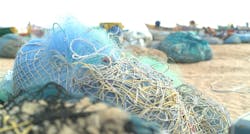Ocean-bound plastic from fishing nets gets new life in Samsung phones
By Bruce Geiselman
Samsung Electronics, prior to unveiling its latest Galaxy cell phones, announced that the phones will incorporate plastic from discarded fishing nets that were likely to enter the ocean, where they could entangle marine wildlife and end up in the human food chain.
In a Feb. 6 announcement, Samsung said it has developed a new material from the nets that it is using in the latest generation of Galaxy devices. While the ocean-bound plastics will make their debut in the newest Galaxy models, the company intends to expand their use in the future.
“Now and into the future, Samsung will incorporate repurposed ocean-bound plastics throughout our entire product lineup, starting with our new Galaxy devices," the company said. The new Galaxy S smartphones were revealed on Feb. 9 in an online event, Unpacked.
“These devices will reflect our ongoing effort to eliminate single-use plastics and expand the use of other eco-conscious materials, such as recycled post-consumer material (PCM) and recycled paper. With this transformation, the future of Galaxy technology will bring leading product design and deliver better environmental impact,” the company said in its announcement.
Ocean-bound plastic is abandoned plastic waste of all sizes that is located within 31 miles of shores in communities or areas where waste management is nonexistent or inefficient, the company said.
Samsung said that more than 705,000 tons of fishing nets are abandoned and discarded every year.
“Lingering in our oceans for centuries, these ‘ghost nets’ are responsible for trapping and entangling marine life, damaging coral reefs and natural habitats and even ending up in our food and water resources,” Samsung said. “These discarded fishing nets are disrupting the delicate balance of our environment at an alarming rate. Collecting and repurposing these nets are vital first steps in keeping our oceans clean as well as preserving the planet and our collective future.”
Recycling the fishing nets is Samsung’s latest effort in what it calls Galaxy for the Planet, a sustainability program aimed at, among other things, incorporating recycled material in all new mobile products by 2025, eliminating single-use plastics from product packaging by 2025 and sending zero waste to landfills by 2025.
In a Feb. 16 press release, DSM Engineering Materials, Geleen, Netherlands, revealed that it worked with Samsung to tailor its Akulon RePurposed resin to meet the specific needs of the Galaxy S22-series smartphones and Tab S8-series tablets. Akulon RePurposed resin is created from abandoned fishing nets collected along India’s coastline. The finished high-performance polymer contains a minimum of 80 percent recycled polyamide 6.
The material is incorporated into components such as the key bracket for the Galaxy S22 and the tablets’ inner support bracket, DSM said.
About the Author
Bruce Geiselman
Senior Staff Reporter Bruce Geiselman covers extrusion, blow molding, additive manufacturing, automation and end markets including automotive and packaging. He also writes features, including In Other Words and Problem Solved, for Plastics Machinery & Manufacturing, Plastics Recycling and The Journal of Blow Molding. He has extensive experience in daily and magazine journalism.
